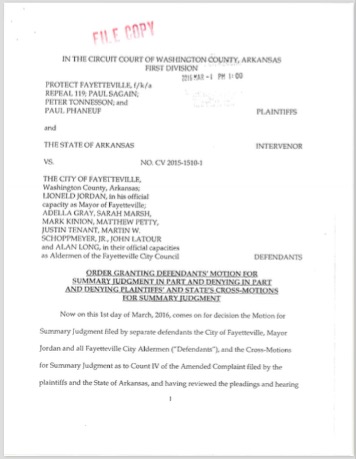Fayetteville’s civil rights ordinance has cleared its first major legal hurdle.
Washington County Circuit Judge Doug Martin ruled Tuesday that the recently adopted Uniform Civil Rights Protection ordinance does not violate state law.
The ruling means Arkansas cities are not prohibited from adopting ordinances that protect the rights of LGBT residents, despite claims to the contrary from the Arkansas Attorney General’s Office and Protect Fayetteville, a group that has fought the ordinance since its inception.
The voter-approved measure (Ordinance 5781) prohibits business owners and landlords from firing or evicting someone because of their sexual orientation or gender identity. Churches, religious schools and daycare facilities, and religious organizations are exempt from the new law.
Martin’s decision will likely be appealed, largely because of the impact it could have on last year’s Intrastate Commerce Improvement Act (Act 137), which bans cities and counties from enacting laws that protect classes of people on “a basis not contained in state law.”
The Arkansas Civil Rights Act already prohibits discrimination on the basis of race, religion, national origin, gender and disability — but not sexual orientation or gender identity.
Because Fayetteville’s law protects LGBT people, Attorney General Leslie Rutledge and supporters of Act 137 said the city directly violated state law by protecting those two classes.
However, Judge Martin agreed with Fayetteville City Attorney Kit Williams’ argument that state law does in fact already mention both classes in several sections of the Arkansas Constitution, including policies related to anti-bullying, domestic violence shelters, and birth certificates.
“Clearly, the classifications of gender identity and sexual orientation were classifications of persons protected on bases contained in state law prior to the enactment of Ordinance 5781,” Martin wrote. “As such, Ordinance 5781 does not create a protected classification on a basis not contained in state law and, therefore, the ordinance does not violate the plain meaning of the language used in the first prong of Act 137.”
Williams said he’s happy with Martin’s decision, but cautioned that the battle is not over.
“I am gratified that we were able to cross this first legal hurdle in our defense of the citizen enacted Uniform Civil Rights Protection ordinance,” Williams wrote in a memo to Fayetteville Mayor Lioneld Jordan. “Because of the importance of this civil rights issue, an appeal to the Arkansas Supreme Court by the Arkansas Attorney General or the plaintiffs is very likely. I will continue to strive to do my best to support our Fayetteville citizens’ enactment of the Uniform Civil Rights Protection ordinance against all challenges.”



